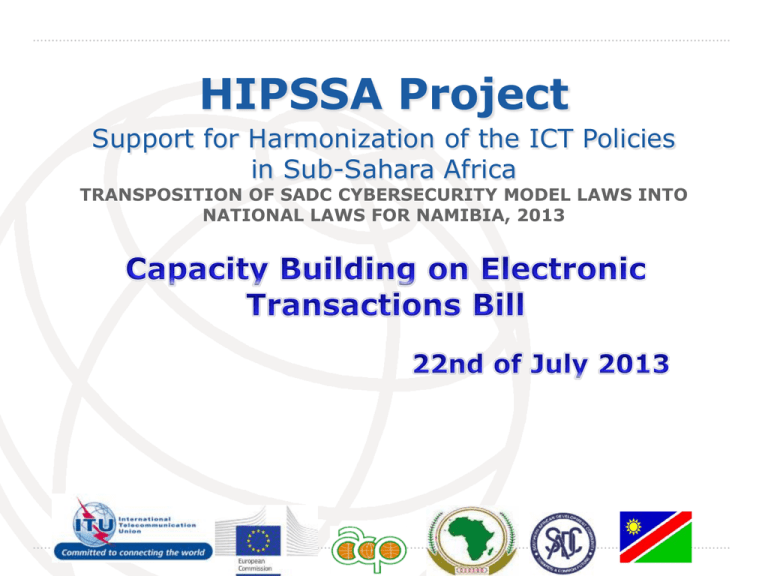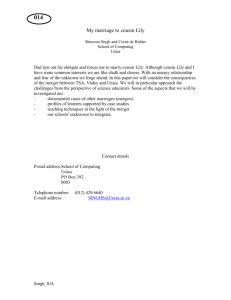
HIPSSA Project
Support for Harmonization of the ICT Policies
in Sub-Sahara Africa
TRANSPOSITION OF SADC CYBERSECURITY MODEL LAWS INTO
NATIONAL LAWS FOR NAMIBIA, 2013
International
Telecommunication
Union
2
CASE LAW
Scope of application
Time and place of e-contracting
Writing
Signature
Advanced electronic signatures
Amendment of existing agreements
electronically
Incorporation by reference
3
Scope of application
SCOPE OF APPLICATION
SMS sent in Haste
• SIHLALI, MAFIKA v SABC CASE NO: J
700/08
Suspended
SMS message
to Chairperson of Board
resigning
5
Resignation accepted via e-mail
message and a follow-up letter
Retraction – not proper resignation
• Not able to retract after resignation was
accepted
6
Sims v. Stapleton Realty, Ltd
2007 Wisc. App. LEXIS 741 (August 23, 2007)
The Sims had entered into a listing
contract with Stapleton 5% commission
sale of the property
Parties lowered the commission in pen
& ink but not term of the listing
contract
E-mail Sims agreed Stapleton entitled
to commission even though beyond
term
Sims disputed commission
7
Electronic amendment
Stapleton asserted that the emails
constituted a written document
under Wisconsin’s Uniform
Electronic Transactions Act
Court of Appeals held parties had
effectively amended a paper-based
real estate listing contract by email
Recognition that the Bill will have great
consequence applies to existing law
also as far as contracts are concerned
SMS sent in Haste (2)
Bill will apply to common law & statutes
Legal recognition of SMS as writing –
sever al consequences
Message content & medium acceptable
as written resignation
Importance: recognition that the Bill will
have great consequence applies current
contracts
9
TIME AND PLACE OF
CONTRACT FORMATION
Julia’s example: Where and when
is the contract formed?
Sisi accesses Julia’s web site
http://www.julia.co.na and she completes
online order form for a leritswana.
Julia
11
Where and when is the contract
formed?
Sisi’s order is automatically accepted by
Julia’s information system.
Sisi lives in Paris, she is currently on a cruise
ship – no Internet access; her e-mail address
is sisi@yahoo.co.uk.
Julia lives in Ludritz;
The pots are shipped from Botswana
?????????????????????????????????
12
WHERE AND WHEN?
Fred, a breeder based in
Windhoek, sells puppies on
www.fredbullterries.co.na. Sue, of Nairobi,
completes an on-line order form on
Friday. She receives an e-mail from Fred
informing her that she will be the owner
of a puppy when proof of payment is
received. She pays and send proof of
payment. Fred’s power is switched off and
he cannot switch on his computer. On
Sunday he sells all five puppies to his
neighbour. Does Sue have an action for
breach of contract?
Theories
Theories:
Information theory
Mailbox/ Postal theory
Place of Contracting
Locus contractus - place of last
step for completion of contract
Place posted; Location of mailbox;
inter partes place where you were
where meeting of minds
If you know when, you know
where!
Difficulty in applying paperbased rules
Time – E-
communications
“instantaneous”?
Mobile devices -
place where last
step
taken….anywhere
E-mail not instantaneous
Prof Chandler: 11 seconds
Received: from mail1.unisa.ac.za
(mail.unisa.ac.za
[163.200.216.139]) by
alpha.unisa.ac.za; Tue, 21 Sep
2004 17:16:42 +0200
Message-ID:
<415045C6.3C77480E@uottawa.
ca> Date: Tue, 21 Sep 2004
11:16:23 -0400
17
Sometime it takes longer…
Unisa student: 2 hours 3 seconds
Received: from mail1.unisa.ac.za
(mail.unisa.ac.za
[163.200.216.139]) by
alpha.unisa.ac.za; Thu, 23 Sep
2004 20:46:44
Received: from mail.telkomsa.net
(nobelium.telkomsa.net
[196.25.69.102]) by
mail1.unisa.ac.za (Postfix) with
ESMTP id 39640340F9 for ; Thu,
23 Sep 2004 20:46:42 +0200
(SAST) Received: (qmail 20465
invoked by uid 104); 23 Sep 2004
18:46:40
Illustration
Namibian Bill: Reception
theory
Where parties conclude a contract by means of
data messages, such contract is formed at the
time when and the place where the acceptance
of the offer becomes effective.
(2) An offer: effective at the time it is received
by the offeree.
(3) The acceptance of an offer effective: at the
time that it is received by the offeror.
Julia’s example: Where and when
is the contract formed?
Sisi accesses Julia’s web site
http://www.julia.co.na and she completes
online order form. It is automatically accepted
by Julia’s information system.
Time acceptance received by offeror
Acceptance enters Sisi’s designated
information system – whether she reads it or
not
BPuppies: WHERE AND
WHEN?
Fred, a breeder based in Maseru sells
puppies on www.fredbullterries.co.ls.
Sue’s proof of payment entered Fred’s
info system on Friday. Objective
requirement – fact that Fred’s power is
switched off and he cannot switch on his
computer is irrelevant.
21
22
Case law: Lost in cyberspace
23
CASE LAW: E-CONTRACTS
Jafta v Ezemvelo KZN Wildlife [2008]
10 BLLR 954 (LC)
Jafta: offer of employment on condition
that he accepts by 24h00 31 December
2007
25
The plot thickens…
He is travelling and later that same evening
received an SMS from Wildlife’s HR Manager
stating that Wildlife needed to know whether
Jafta was going to accept its offer.
Jafta replied by SMS:
Have responded to the affirmative through a letter
emailed to you this evening for the attention of your
CEO. Had problems with email I had to go to internet
café.
Wlidlife never receives his e-mail. Wildlife
hired the next candidate and Jafta sued for
breach of contract
26
Was a contract formed?
At trial, the HR Manager denied
receiving Jafta’s e-mail but admitted
receiving the text, although she could
not recall seeing the word “affirmative”
in it.
Wildlife’s defense: there was never a
contract, because its offer had not been
validly accepted.
27
Jafta court
The Court held: Jafta’s SMS reply “to
the affirmative” was a direct and
unequivocal acceptance of the offer and
formed a valid contract.
Text messages may seem casual, it
would be a mistake to treat them as
having no legal effect. A valid and
enforceable contract can be formed
through the exchange of text
messages.
Jafta
Court criticised ECT Act –
no provision for risk allocation if data
messages lost in cyberspace
ECT Act clear – sent not received - Contract
not formed - Lost in cyberspace...
Designated information system or
system used for that purpose – SMS
message from HR
29
Burden of use of technology
has shifted
Postal – offeror risk
E-communications
addressee carries risk
30
SM Integrated Transware Pte
Ltd v Schenker Singapore
Singapore: High Court[2005] SGHC 58
Question:
can an exchange of e-mails can result in
biding lease agreement?
Civil Law Act (Cap. 43) (“CLA”) requires for a
lease of land a written memorandum or note
evidencing the terms of the agreement and
the signature of the document by the person
against whom the contract was to be enforced
(section 6 (d) of the CLA1).
31
E-mails contained lease
agreement
The court held:
Plaintiff’s e-mail with draft lease as
attachment & the defendant’s e-mail reply
accepting the terms amounted to a
memorandum in the meaning of article 6 of
the CLA, as they contained the essential
terms of the lease.
NOTE: Illustrates incorporation by reference
32
Lease signed by lessor?
Court held the common law concept of
“signature” loosely interpreted - typewritten or
printed form of a signature are sufficient.
Typewritten form = signature typed e-mail
In casu the signature requirement was met
even though the sender’s name was not typed
into the e-mail, but only appeared in a line
reading “From: [sender’s name]...”, if:
the sender knew that his name appeared at the
head of every message next to his e-mail address so
clearly that there could be no doubt that he was
intended to be identified as the sender of the
message (art. 7 (1) (a) MLEC).
Incorporation by reference
Information shall not be denied
legal effect, validity or
enforceability solely on the
grounds that it is not contained in
the data message purporting to
give rise to such legal effect, but is
merely referred to in that data
message.
Best practice: Ticket cases
Were terms expected?
No
Yes
Not bound
Would reasonable person have
noted the incorporation?
No
Bound whether terms
were read or not.
Example
New Tariffs New Telkom tariffs w.e.f. 1 August
2007... more>>Buy a PC from Telkom! Buy a PC on
your Telkom account for as little as R219.37 per
month... more>>Telkom PrepaidFone WayaWaya Stay connected all year for R120 and ringa
waya-waya more>>Moving home? Now Telkom
SmartMoves has an easy to use service to inform
your friends and family your new contact details in
one go!....... more>>Let your opinion be heard...
Have your say and earn exciting rewards... more>>
Home |PAIA |Terms & Conditions |Proudly South
African
© Telkom SA Limited. 2007. All Rights
Reserved
© IN TERMS OF SECTION 11 OF THE ELECTRONIC
COMMUNICATIONS AND TRANSACTIONS (ECT) ACT 25 OF 2002
AND THE COMMON LAW OF CONTRACT, THESE TERMS AND
CONDITIONS ARE VALID, BINDING AND ENFORCEABLE
AGAINST ALL PERSONS THAT ACCESS THE TELKOM WEBSITE,
WEB PAGES OR ANY PART THEREOF.
IF YOU DO NOT AGREE TO BE BOUND BY THESE TERMS AND
CONDITIONS YOU MAY NOT USE THE TELKOM WEBSITE.
REASONABLE USE OF THE TELKOM WEBSITE SHALL
AUTOMATICALLY BIND THE USER TO THIS AGREEMENT.
DEFINITIONS AND INTERPRETATION
Hyperlinks herein to legal documents should be deemed part of these
terms and conditions in terms of section 11(3) of the ECT Act. The
fact that some or all of the hyperlinks may,
from time to time, be non-operational, shall
not affect the validity and interpretation of
these terms and conditions.
f) Telkom's Standard Terms and Conditions for the provision of Public
Switched Telecommunication Services (also referred to as the
"Abridged Conditions of Contract")". Please click here to access the
Abridged version
as well as the complete set of Terms and Conditions.
Online Bill Terms and Conditions
Ease-e-Bill Terms and Conditions
37
Best practices links:
Referred to in a way in which a
reasonable person would have
noticed the reference thereto and
incorporation thereof
• Font size / colour
• Place on web page
Links MUST work
38
Conclusion
Application of rules on electronic
transactions
Paper-based contracts e-amended
Common law applied e-contracts
Incorporation by reference – links
must be visible and must work
39
THANK YOU…
Tana Pistorius
ITU INTERNATIONAL EXPERT
pistot@unisa.ac.za
Research Professor: UNISA
Union Internationale des Télécommunications
International Telecommunication Union





